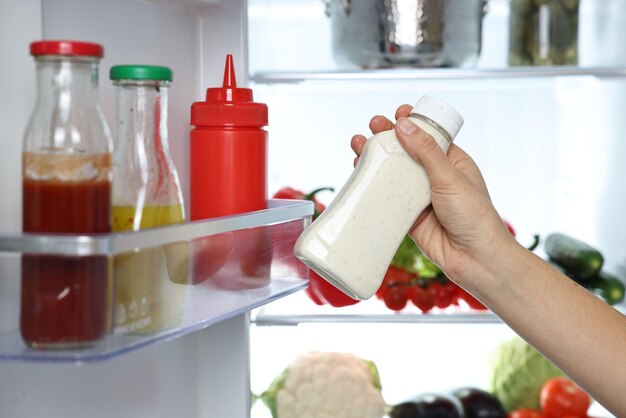How Long Does Butter Really Last in Your Refrigerator?
Butter is indispensable in many kitchens, offering a creamy taste essential to countless recipes. As an everyday staple, understanding how long butter remains fresh in your refrigerator is crucial for both health and optimal taste. Let's dive into everything you need to know about storing butter properly, maximizing its shelf life, and ensuring it remains fresh for your culinary creations.
🧈 The Shelf Life of Butter: What to Expect
Butter Storage Basics
Butter, when stored correctly, can last for a considerable time, making it a convenient and long-lasting resource in your kitchen. Generally, sealed butter will remain fresh in the refrigerator for 1 to 3 months past its printed expiration date. However, once opened, it's best to use butter within a month for peak freshness.
- Unopened Butter: Typically lasts up to 3 months past the expiration date when refrigerated.
- Opened Butter: Maintains quality for up to 1 month in the refrigerator.
- Salted vs. Unsalted: Salted butter usually lasts longer due to the preservative nature of salt, which inhibits bacterial growth.
Freezing Butter for Extended Storage
If you seek to extend the shelf life of your butter, freezing is an excellent option. Wrapped tightly and stored in an airtight container, butter can last up to a year in the freezer without losing flavor or texture.
🥶 Best Practices for Storing Butter
Keeping butter fresh isn't just about refrigeration timeframes. Storage methods can significantly impact butter's quality and taste:
1. Refrigerator Placement
The temperature in different parts of a refrigerator can vary. For optimal freshness:
- Butter Compartment: While convenient, it's often warmer. Instead, store your butter on the middle shelf.
- Back of the Fridge: Provides consistent cold temperatures, extending butter's lifespan.
2. Proper Wrapping
- Original Wrapping: Keep butter in its original packaging to protect against exposure to air and aromas from other foods.
- Airtight Containers: Consider storing butter in an airtight container or wrapping it tightly in aluminum foil to add another layer of protection.
3. Avoiding Contamination
When using butter:
- Clean Utensils: Always use a clean knife or utensil to prevent introducing bacteria.
- Small Portions: If using butter frequently at room temperature (e.g., for spreads), only leave out a limited portion to minimize spoilage.
🧈 Recognizing Butter Spoilage
Identifying when butter has gone bad is essential for ensuring food safety. Here are common signs that butter is spoiled:
- Sour or Rancid Smell: Fresh butter has a mild, creamy odor. If it noticeably smells sour or like cheese, it's likely spoiled.
- Discoloration: Butter that develops spots or alters in color should be discarded.
- Off Taste: A sharp, unpleasant taste indicates spoilage.
🕒 How Long Can Butter Be Left Out?
Many people enjoy leaving butter at room temperature for ease of spreading, but it's crucial to do so safely.
- Salted Butter: Can be left out for 1-2 days safely, as salt acts as a preservative.
- Unsalted Butter: More prone to bacteria and mold, limit room temperature time to a few hours.
Ensure unsalted butter that sits out is used quickly and only leave small portions out at any time.
🥄 Using and Enjoying Butter: Practical Tips
Here are some quick tips for using butter in your meals and ensuring you're getting the most out of this kitchen staple:
In Cooking and Baking
- Room Temperature Butter: Many recipes call for softened butter for proper mixing. Achieve this by leaving butter out for about 30 minutes before use.
- Melting Butter: When melting butter, do so gently over low heat to avoid separation or burning.
Pairing Butter with Foods
- Butter as a Spread: Enhanced by adding herbs or garlic for compound butter spreads; perfect for bread and roasted vegetables.
- Flavor Addition: Use butter as a final touch for sauces, pasta, or to finish meats for a glossy, enhanced flavor.
Practical Summary: Butter Storage Tips 📝
To keep your butter fresh and extend its usability, follow these practical storage tips:
- 🧈 Refrigerate promptly: Store butter in the middle of the refrigerator.
- 🧊 Consider freezing: Extend its life up to a year by wrapping tightly and freezing.
- 🥡 Use containers: Opt for airtight storage solutions to protect flavor.
- 🚫 Monitor spoilage signs: Watch for strange smells, tastes, or colors.
With these strategies, you can enjoy the richness of butter while minimizing waste and ensuring safety.
🍽 Final Thoughts: Butter for Every Kitchen
Butter remains an essential ingredient that elevates flavors in a myriad of dishes. By understanding how to store it properly, recognizing the signs of spoilage, and appreciating its role in cooking, you can maximize its shelf life and quality.
Keep these insights in mind to enjoy rich, flavorful butter tailored to every culinary delight in your kitchen. Whether used for cooking, baking, or simply spreading atop your favorite bread, butter's versatility is surpassed only by its deliciousness. Remember, proper storage is key to harnessing the full benefits of this kitchen staple.

